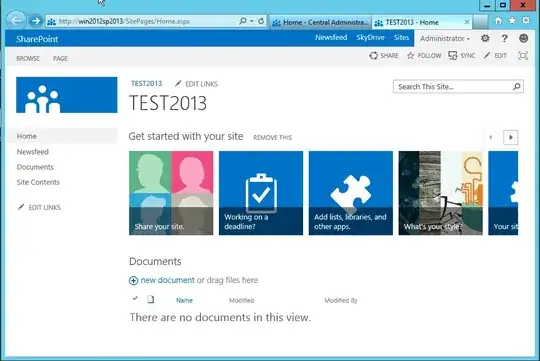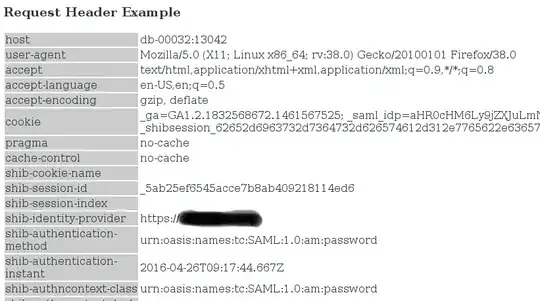My stack looks like this:
- Apache httpd server 2.4.12: with mod_shibd, mod_proxy_http & mod_proxy_wstunnel
- Shibboleth 2.5
- Apache Tomcat 7.0.54
Our scenario looks like this:
--------- -------------- ---------------
|Browser| <----> |Apache httpd| <----> |Apache Tomcat|
--------- HTTPS -------------- HTTP ---------------
The apache httpd configuration:
<LocationMatch (^/test-websockets/.*)>
AuthType Shibboleth
ShibRequestSetting requireSession true
ShibUseHeaders On
ShibExportAssertion Off
Require valid-user
</LocationMatch>
ProxyPass /test-websockets ws://db-00032:13042/test-websockets
ProxyPassReverse /test-websockets ws://db-00032:13042/test-websockets
The apache-tomcat http connector:
<Connector port="13042" protocol="HTTP/1.1" connectionTimeout="20000" redirectPort="13043" maxHttpHeaderSize="65536"/>
And finally the applications(s), any of the websockets samples that comes with the /examples applications of the binary tomcat distribution.
The good news are that the websockets application and the shibboleth SP work! So I can play the good and old snake video game being authenticated by our SSO and authorized by my shibboleth SP, hooray!
But, there is always a but, the bad news are that if I request the also good and old /servlets/servlet/RequestHeaderExample my shibboleth headers are not there, no bueno!
Enabling the Request Dumper Filter in the application I can see the HTTP request headers that hit the apache-tomcat:
===============================================================
START TIME =26-Apr-2016 15:59:36
requestURI=/test-websockets/servlets/images/return.gif
authType=null
characterEncoding=null
contentLength=-1
contentType=null
contextPath=/test-websockets
cookie=_ga=GA1.2.1832568672.1461567525
cookie=_saml_idp=aHR0cHM6Ly9jZXJuLmNoL2xvZ2lu
cookie=_shibsession
header=host=
header=user-agent=Mozilla/5.0 (X11; Linux x86_64; rv:38.0) Gecko/20100101 Firefox/38.0
header=accept=image/png,image/*;q=0.8,*/*;q=0.5
header=accept-language=en-US,en;q=0.5
header=accept-encoding=gzip, deflate
header=referer=
header=cookie=
header=connection=keep-alive
header=if-modified-since=Fri, 26 Sep 2014 13:25:30 GMT
header=if-none-match=W/"1231-1411737930000"
header=cache-control=max-age=0
locale=en_US
method=GET
pathInfo=null
protocol=HTTP/1.1
queryString=null
remoteAddr=128.142.201.245
remoteHost=128.142.201.245
remoteUser=null
requestedSessionId=null
scheme=http
serverName=THE ONE DECLARED IN THE APACHE HTTPD VIRTUALHOST SECTION
serverPort=80
servletPath=/servlets/images/return.gif
isSecure=false
------------------=--------------------------------------------
------------------=--------------------------------------------
authType=null
contentType=null
header=ETag=W/"1231-1411737930000"
remoteUser=null
status=304
END TIME =26-Apr-2016 15:59:36
===============================================================
However when I force the browser cache (Ctrl+F5) I get my headers:
OK, I can see that now in the host header I am getting the apache-tomcat one, however I do not think that it has something to do with the issue, or maybe I am wrong?
Any thoughts on this?
Thanks in advance,
Luis
PS: I am wonder if this could be related with the --enable-proxy_wstunnel=shared option See "tunneling secure websocket connections with apache"


